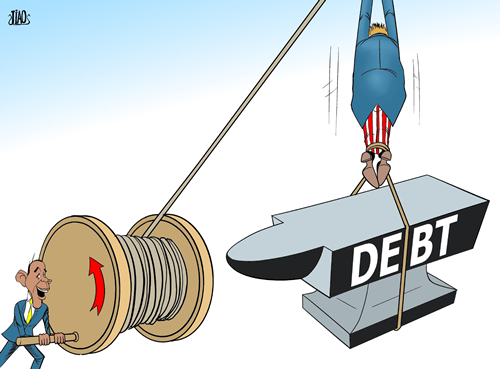Debate: US debt ceiling
 0 Comment(s)
0 Comment(s) Print
Print E-mail
China Daily, August 1, 2011
E-mail
China Daily, August 1, 2011
|
|
|
Raising the debt ceiling [By Jiao Haiyang/China.org.cn] |
What lies in store for the rest of the world as rival US politicians fight over raising the federal government's debt ceiling? Two experts enlighten us with their views.
Yao Yang: Obama paying for his presidency
American politics is facing a political showdown. If Congress and the White House cannot reach a compromise to raise the debt ceiling by Aug 2, the federal government will have to either shut down part of its operations or default on some of its debts. Shockwaves will debilitate the markets in either case, and the global economy's fragile recovery will probably be reversed, and another recession could follow.
Because of these dire consequences, it is highly unlikely that Congress and the White House will fail to reach an agreement by Aug 2, unless hardliners in the Republican camp are crazy enough to trade the country's fate for President Barack Obama's scalp.
Most people believe that a short-term agreement is likely to be reached between the Republicans and Democrats to raise the debt ceiling for a short period, say by three months. But the debt issue is a hostage that Republicans are using to undermine Obama's re-election bid.
If the Republicans do use the debt ceiling to thwart Obama's re-election bid, they will throw the entire global economy into deep uncertainty for the next 16 months. The unemployment rate in the US is still above 9 percent, and the uncertainty caused will further discourage companies to recruit more people. The sluggish recovery in the US will drag down economic growth across the world.
Worse, to boost the confidence of the business world, the US Federal Reserve (Fed) is likely to announce a third round of quantitative easing (or QE3), which will force emerging markets to face even greater pressures of inflation and currency revaluation.






